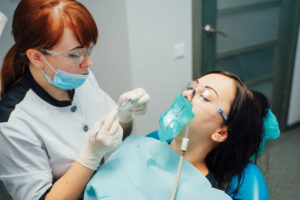Sedation Dentistry
Sedation is widely recognized as a treatment for anxious or fearful dental patients. This involves the use of medication that relaxes your body & mind.
 The most common form of sedation is conscious sedation, which allows you to be awake & able to communicate with the dentist. You will not sleep through your procedure, but you will feel drowsy, calm & comfortable. Though you will be awake, you may have trouble remembering details about your appointment. In fact, you may not remember any of it!
The most common form of sedation is conscious sedation, which allows you to be awake & able to communicate with the dentist. You will not sleep through your procedure, but you will feel drowsy, calm & comfortable. Though you will be awake, you may have trouble remembering details about your appointment. In fact, you may not remember any of it!
There are three types of conscious sedation available to dentists: nitrous oxide gas, oral (pill) sedation & intravenous (IV) sedation.
What Is Sedation Dentistry?
Do you struggle to go to the dentist? Does the thought of being in a dental chair fill you with dread? Have bad experiences in the past caused you to avoid or miss recent dental appointments? You are not alone. Millions of patients worldwide share the same fear of dental work. Fortunately, we can help.
At our practice, you don’t need to suffer in silence & neglect your oral health. We offer sedation dentistry to patients of all ages with different levels of anxiety, ranging from mild nervousness to extreme phobias. It is our belief that your comfort at the dentist is essential to maintaining your dental hygiene.
Sedation Dentistry Treatments
Nitrous Oxide
Nitrous oxide, also known as “laughing gas”, is the lightest form of sedation. It is given to patients through a small mask that covers the nose. It works almost instantly, & the dentist can precisely adjust the amount of gas you are breathing whenever you need more or less. The biggest advantage of nitrous oxide is that once the dentist turns it off, you’ll be back to normal within a few minutes! You will be able to drive home after your appointment is over. Side effects are rare, but most often include nausea, headaches & dizziness.
Oral Sedation
Oral sedation involves taking an anti-anxiety pill about an hour before your treatment is scheduled to begin. This is a useful method for patients who want an easy form of sedation that doesn’t require as much in-office maintenance or equipment. Unlike nitrous oxide, oral sedation will leave you groggy, tired & uncoordinated after your appointment, so you will need a friend or family member to drive you home.
Intravenous (IV) Sedation
Intravenous (IV) sedation is the strongest form of conscious sedation. It uses the same kind of medication as oral sedation, but the dentist will use a needle to inject it directly into your bloodstream. This makes the drug kick in much faster & stronger. The dentist can also “fine-tune” the dosage so you don’t get too sedated. You will recover more quickly from IV sedation than oral sedation, but you will still need somebody to drive you home.
Overview
Before receiving any of these forms of sedation, there are a few things you will need to do to prepare. First, you will need to consult with us to see if you are a candidate for sedation. There are a number of medical conditions that dental sedation can worsen, including heart, lung & liver dysfunction. Nursing or pregnant women cannot receive sedation because it may endanger the life & development of their child. Talk to our team or your primary care doctor about your diagnoses & the potential risks of sedation.
Then, you will need to provide us with a list of the prescription & over-the-counter medications & dietary supplements you take regularly. Some may interact negatively or dangerously with dental sedatives.
Aftercare
Finally, you must not eat or drink non-clear liquids for at least six hours before your appointment. If you are receiving oral or IV sedation, arrange for somebody to drive you to & from our office. Make sure your schedule is clear for the rest of the day & do not drive, engage in strenuous physical activity or operate heavy machinery until the next day.
Don’t let dental fear keep you from getting the beautiful smile you deserve. Call us today to find out what kind sedation is right for you.
